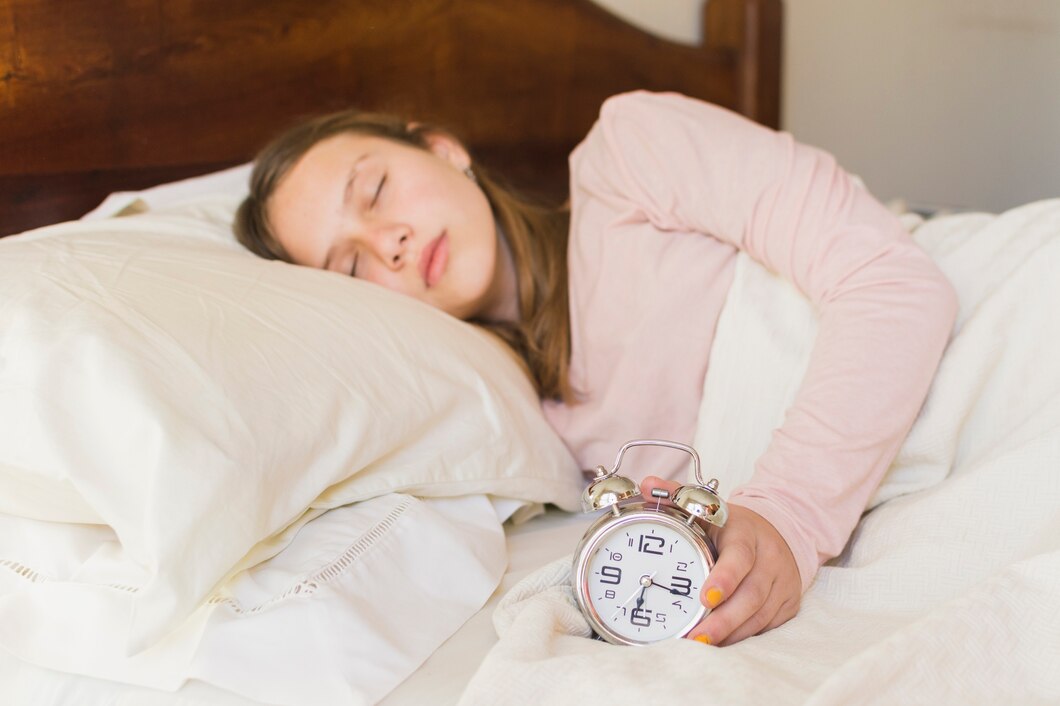
Understanding Sleep Cycles: How to Wake Up Feeling Fresh
Sleep has stages that play key roles for the brain and body. If you follow the science of sleep cycles, your sleep will be better, and you will not wake up groggy.
This guide covers the importance of REM sleep, the benefits of deep sleep, and how to use sleep cycle science. It aims to help us improve our rest and morning routines.
The Science of Sleep Cycles

Sleep isn’t a single, uniform state; it occurs in cycles, each lasting about 90 minutes. A full night’s sleep consists of 4-6 cycles, moving through different stages:
1. Stage 1 (Light Sleep)
- The transition phase between wakefulness and sleep.
- Lasts about 5-10 minutes.
- Waking up from this stage can leave you a bit tired but not groggy.
2. Stage 2 (Deeper Light Sleep)
- Heart rate and body temperature drop.
- Brain activity slows, but bursts of activity called sleep spindles help process memories.
- Makes up about 50% of total sleep.
3. Stage 3 (Deep Sleep / Slow-Wave Sleep)
- Crucial for physical recovery and immune function.
- Brain waves slow significantly.
- Muscles repair, and growth hormones are released.
- Waking up during this stage causes extreme grogginess.
4. Stage 4 (REM Sleep – Rapid Eye Movement)
- Brain activity increases, similar to wakefulness.
- Dreams occur, and emotional processing happens.
- Essential for memory consolidation and learning.
- REM cycles lengthen as the night progresses.
The Importance of Deep Sleep & REM Sleep

Deep Sleep Benefits
- Supports muscle growth and tissue repair.
- Strengthens the immune system.
- Helps regulate metabolism and blood sugar levels.
- Plays a role in memory storage and cognitive function.
REM Sleep Importance
- Helps process emotions and regulate mood.
- Enhances problem-solving skills and creativity.
- Supports brain detoxification and neural repair.
- Essential for learning and long-term memory retention.
How to Wake Up Feeling Fresh
1. Align Sleep with Your Natural Sleep Cycles
- Since each sleep cycle lasts about 90 minutes, aim to wake up at the end of a cycle rather than in the middle of deep sleep.
- Use a sleep calculator to find the best bedtime for your wake-up time. For example, if you wake up at 7 AM, go to sleep at 10:30 PM for five complete cycles.
2. Use Smart Alarms for Gentle Wake-Ups
- Apps and smartwatches track sleep cycles and wake you during light sleep.
- Natural light alarm clocks mimic sunrise to help your body wake up gradually.
3. Improve Sleep Quality for Better Cycles
- Stick to a consistent bedtime and wake-up time.
- Avoid caffeine and heavy meals before bed.
- Engage in relaxation techniques like deep breathing or meditation.
- Keep your bedroom cool, dark, and quiet.
4. Exercise for Restorative Sleep
- Moderate exercise during the day promotes deeper sleep at night.
- Avoid intense workouts close to bedtime to prevent overstimulation.
5. Manage Stress to Prevent Sleep Disruptions
- High-stress levels increase cortisol, disrupting sleep cycles.
- Reduce evening screen time to limit blue light exposure.
- Practice mindfulness or journaling before bed.
Tips for Optimising Your Sleep Cycles
1. Follow a Sleep Schedule
- Go to bed and wake up at the same time every day, even on weekends.
- A regular sleep routine strengthens circadian rhythms and improves overall sleep quality.
2. Limit Stimulants in the Evening
- Avoid caffeine at least 6 hours before bedtime.
- Reduce nicotine and alcohol intake as they disrupt REM sleep.
- Opt for sleep-friendly herbal teas like chamomile or valerian root.
3. Improve Your Sleep Environment
- Keep your bedroom between 60-67°F (15-19°C) for optimal comfort.
- Use blackout curtains to eliminate light pollution.
- Invest in a high-quality mattress and pillows that support your sleep posture.
4. Adopt a Bedtime Wind-Down Routine
- Take part in calming activities like reading, gentle stretching, or enjoying soft music.
- Practice breathing exercises like 4-7-8 breathing to calm the nervous system.
5. Nap Strategically
- If you need to nap, keep it short (20-30 minutes).
- Napping too late in the day can interfere with nighttime sleep quality.
How Sleep Deprivation Affects Sleep Cycles
Poor sleep habits or lack of sleep can disrupt natural sleep cycles, leading to:
- Increased daytime fatigue and irritability.
- Weakened immune system and increased susceptibility to illnesses.
- Difficulty concentrating and impaired memory.
- Higher risk of chronic conditions such as heart disease and diabetes.
- Imbalances in hunger hormones that contribute to weight gain.
The Role of Nutrition in Sleep Cycles
Certain nutrients support deeper, more restorative sleep:
- Magnesium: Found in leafy greens, nuts, and seeds. It relaxes muscles and promotes deep sleep.
- Tryptophan: An amino acid found in turkey, eggs, and dairy. It helps produce serotonin and melatonin.
- Omega-3 Fatty Acids: Found in fish and flaxseeds, they support brain function and REM sleep.
- Vitamin D: Deficiency in vitamin D is linked to poor sleep quality. Get enough sunlight, or consider supplements.
How Technology Impacts Sleep Cycles
- Blue light from screens suppresses melatonin and delays REM sleep.
- Social media scrolling increases mental stimulation, making it harder to fall asleep.
- Using sleep-tracking apps can help monitor sleep cycles and identify areas for improvement.
- Smart home devices can change the room temperature. They can also dim the lights and make the space comfy for sleep.
Mastering Your Sleep Cycles

Knowing about sleep cycles and good sleep habits helps you wake up refreshed. Focus on improving deep sleep and REM sleep for better mornings. Adjusting your sleep to natural 90-minute cycles helps you wake up refreshed. This way, you avoid grogginess and improve your daytime performance.
Change how you see sleep. Think of it as key to your overall health. This is the first step to improving your sleep and boosting your energy!


